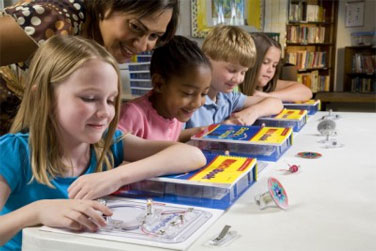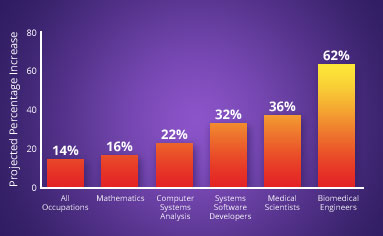President Barack Obama
KitBooks offers a new, approachable way to learn.

Did you know that only 16 percent of American high school seniors are proficient in math and interested in a Science, Technology, Engineering, or Math (STEM) career? United States students are falling behind internationally, ranking 25th in mathematics and 17th in science among industrialized nations.
Yet the demand for STEM-related jobs is projected to rise tremendously. Visit www.ed.gov/stem for more information.
The President has called for a clear priority on STEM education: within a decade, American students must “move from the middle to the top of the pack in science and math.”
The growing emphasis on STEM education requires new tools and new teaching methods. That’s where the award-winning KitBook comes in. KitBooks are the seamless combination of a science kit and a textbook. Think: Science Kit + Text Book = KitBook
The KitBook is the only STEM-related book on the market that contains the hands-on science kit within the book. The unique and patented KitBook design challenges students to become problem-solvers, critical thinkers, and technologically literate.
The KitBook is effective with almost all teachers and students because it appeals to each of the seven learning styles.
KitBooks are ideally suited to help teachers and students meet the rising demands of STEM education. They meet the National Science Education Standards and are compatible with common core requirements.
The Seven Learning Styles
Seven Styles of Learning, One KitBook
Visual (spatial) learners prefer using pictures, images, and spatial understanding.
Aural (auditory-musical) learners prefer using sound and music.
Verbal (linguistic) learners prefer using words, both in speech and writing.
Physical (kinesthetic) learners prefer using their bodies, hands, and sense of touch.
Logical (mathematical) learners prefer using logic, reasoning, and systems.
Social (interpersonal) learners prefer to learn in groups or with other people.
Solitary (intrapersonal) learners prefer to work alone and use self-study.
Awards and Honors
Parents’ Choice Award
![]() The Electric Circuits KitBook earned a Parents’ Choice Silver Honor Award in 2008in the Doing & Learning category. Reviewers commented that the Electric Circuits KitBook is “Technically thorough and well written.”
The Electric Circuits KitBook earned a Parents’ Choice Silver Honor Award in 2008in the Doing & Learning category. Reviewers commented that the Electric Circuits KitBook is “Technically thorough and well written.”
Association of Educational Publishers (AEP)
![]() The Electric Circuits KitBook earned a Distinguished Achievement Award (DAA) in the K-5 Science Instruction Book category from the Association of Educational Publishers in 2008.
The Electric Circuits KitBook earned a Distinguished Achievement Award (DAA) in the K-5 Science Instruction Book category from the Association of Educational Publishers in 2008.

